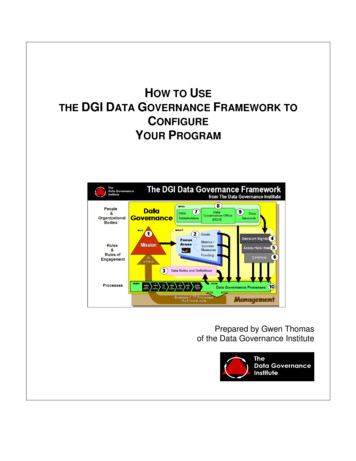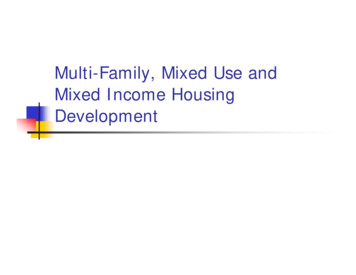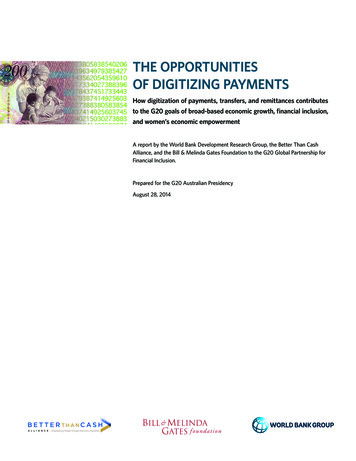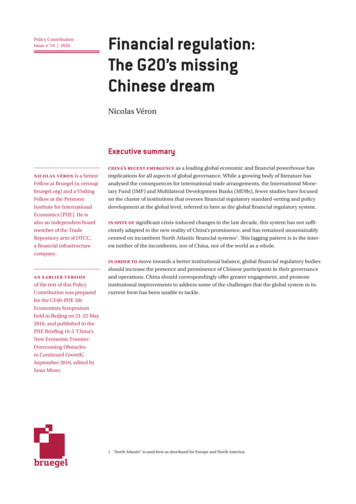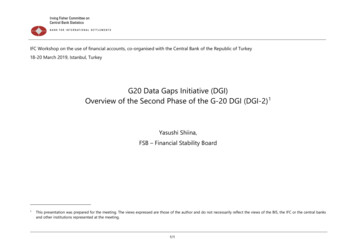
Transcription
IFC Workshop on the use of financial accounts, co-organised with the Central Bank of the Republic of Turkey18-20 March 2019, Istanbul, TurkeyG20 Data Gaps Initiative (DGI)Overview of the Second Phase of the G-20 DGI (DGI-2) 1Yasushi Shiina,FSB – Financial Stability Board1This presentation was prepared for the meeting. The views expressed are those of the author and do not necessarily reflect the views of the BIS, the IFC or the central banksand other institutions represented at the meeting.1/1
G20 Data Gaps Initiative (DGI)Overview of the Second Phase of the G-20 DGI (DGI-2)Yasushi Shiina, Member of Secretariat18 March 2019Note: This document is prepared to provide a brief overview on the status.
Outline1.Background: G20 Data Gaps Initiative (DGI)2.DGI-2 work in 20183.Next steps: DGI-2 in 2019-1-
Background: The G20 Data Gaps Initiative (DGI) The 2007-08 global financial crisis highlighted the need for timely and accurateinformation/data for policy makers and market participants to develop effectiveresponses to events. In response to the G20 request to explore data gaps and strengthen data collection, thefirst phase of the Data Gaps Initiative (DGI-1) was launched in October 2009 that include20 recommendations covering:‒the build-up of risk in the financial sector;‒international financial network connections;‒vulnerability of domestic economies to shocks; and‒communication of official statistics. DGI-1 recs focused on development of conceptual frameworks in areas where datacollection did not exist (e.g. linkages among G-SIFIs) and improvement of data collectionin areas where frameworks already existed (e.g. Financial Soundness Indicators). DGI-1 concluded in 2015 with most of the recommendations completed or advanced.‒However, some areas were identified as in need of further efforts – sectoralaccounts (divergence in the implementation of statistical frameworks and the needof coordination at the national-level) and government finance statistics.-2-
An overview of the second phase ofthe G20 Data Gaps Initiative (DGI-2) The second phase of the G20 DGI (DGI-2) was launched in September 2015 toconsolidate the progress made, and to promote regular data collection especially in areasconceptual frameworks have been developed.‒20 new/revised recommendations were developed to implement “the regularcollection and dissemination of comparable, timely, integrated, high quality, andstandardized statistics for policy use”.‒The DGI-2 recs focus on: (i) monitoring risk in the financial sector; (ii) analysis ofvulnerabilities, inter-connections and spillovers; and (iii) data sharing andcommunication of official statistics.Horizon for implementation is 2021.‒As in DGI-1, main developments are reported annually to the G20 in a ProgressReport prepared by the FSB Secretariat and IMF Staff, in coordination with IAG.‒A monitoring framework (e.g. traffic lights dashboard) is in place since 2017 to keeptrack of the progress.Possible synergies with other relevant global initiatives are monitored (e.g. measurementof the digital economy, promotion of the Global LEI, adherence to the Special DataDissemination Standard Plus, dialogue with the G20 IFA WG).-3-
ReferenceOverview of G20 DGI-2 RecommendationsSource: Heath and Bese Goksu (2016) and : FSB Secretariat and IMF Staff (2015).-4-
ReferenceCommon priorities ofthe G20 DGI-2 recommendations Disseminating consistent and comparable Financial Soundness Indicators.[Rec II.2] Ensuring regular collection of the International Bankingthe Coordinated Portfolio Investment Survey. [Recs II.11-12] Providing consistent securities statistics. [Rec II.7] Improving the availability of sectoral accounts data. [Rec II.8] Disseminating timely and comparable general government operations and debt data.[Recs II.15-16]Source: FSB Secretariat and IMF Staff (2015)Statisticsand-5-
DGI-2 work in 2018 DGI-2 Annual Global Conference and thematic workshops–Annual Global Conference (Basel, 30-31 May 2018)–Three thematic workshops (January – March 2018): Residential/Commercial property price indexes (Recs. II.17-18) Institutional sector accounts (Rec. II.8) Securities statistics (Rec. II.7) Technical-level meetings are also held to take forward some DGI-2recommendations (e.g. Rec. II.5 on Non-Bank Financial Intermediation (NBFI), RecII.6 on OTC derivatives) Dissemination of reporting guidelines/templates and technical guidance forseveral DGI-2 recommendations (e.g. Reporting Guidelines on securities financingdata (Rec II.5); technical guidance on UTI/UPI* (Rec II.6).*: UTI is Unique Transaction Identifier and UPI is Unique Product Identifier.Source: FSB Secretariat and IMF Staff (2018)-6-
Main findings from the DGI-2 work in 2018 Main findings from the 2018 progress report on the implementation of DGI-2recommendations include the followings:‒ Considerable progress was made by the DGI-2 participating economies during itssecond year. This includes, among others, NBFI monitoring, reporting of G-SIBs data,improved sectoral accounts data (coverage, timeliness, periodicity). All G20 nowreport their International Investor Position (IIP) quarterly and core CoordinatedPortfolio Investment Survey (CPIS) data semi-annually.‒ Key challenges remain and high-level political support is crucial to overcome them.Such challenges include: adequate resource allocation (e.g. skills, IT); appropriateinfrastructure for data access and data sharing; as well as strengthened inter-agencycoordination at the national level.‒ In terms of specific DGI-2 recommendations, some key challenges remain, forexample, with the compilation of quarterly institutional sectoral accounts, governmentdeficit and debt, IIP currency breakdown for non-financial corporations, identificationof other financial corporations in the IIP and NBFI monitoring, and commercialproperty price index.‒ Overcoming ementwithDGI-2‒ Further progress in implementing the DGI-2 is expected from the participatingeconomies.Source: FSB Secretariat and IMF Staff (2018)-7-
Overall implementation status ofthe DGI-2 RecommendationsReferenceRec. II.8 Sectoral accounts: As in 2017,further progress is expected for countrieswith less developed statistical : Progress is yet to be made assources and compilation methods are underdevelopment.Rec. II.10 International Investment Position(IIP): 6 economies are reporting thecurrency composition data.Rec. II.18 Commercial Property Price Index(CPPI): No harmonised methodologicalframework nor detailed methodologicalguidance available yet.Rec. II.18 CPPI: Action plan still to beelaborated.Source: FSB Secretariat and IMF Staff (2018)-8-
Next steps: DGI-2 work in 2019 FSB and IMF, in coordination with the IAG and in consultation with the participatingeconomies, are preparing the fourth Progress Report for submission to the G-20 inOctober 2019.‒ As in previous Reports, the 2019 Report will be based on survey responses andinputs from DGI-2 participating economies and IAG members. To facilitate progress in implementing the challenging DGI-2 recommendations, theDGI-2 work programme in 2019 include:‒ thematic workshops (on CPPI, sectoral accounts, and government finance anddebt statistics);‒ other technical-level workshops and meetings (e.g. FSB-BIS workshop onsecurities financing data collection and aggregation); and‒ the annual DGI Global Conference. Dialogue with the potential users of data is essential and will aim to enhance therelevance of the DGI-2.-9-
ReferenceUsing financial sector balance sheet data forNBFI monitoring (1)Source: FSB (2019)- 10 -
ReferenceUsing financial sector balance sheet data forNBFI monitoring (2)Source: FSB (2019)- 11 -
ReferenceUsing financial sector balance sheet data forNBFI monitoring (3)Source: FSB (2019)- 12 -
ReferenceUsing financial sector balance sheet data forNBFI monitoring (4)Source: FSB (2019)- 13 -
the G20 Data Gaps Initiative (DGI-2) - 3 - The second phase of the G20 DGI (DGI-2) was launched in September 2015 to consolidate the progress made, and to promote regular data collection especially in areas conceptual frameworks have been developed. ‒ 20 new/revised recommendations were developed to implement "the regular
